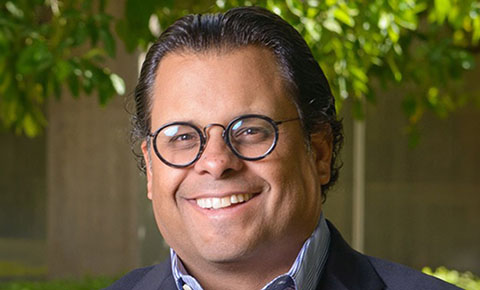Brayboy Challenges SESP to Reimagine Education for Indigenous Students
 Scholars have an important opportunity and responsibility to help transform schools into a system that supports Indigenous students, Arizona State University (ASU) professor Bryan McKinley Jones Brayboy (Lumbee) said during the latest installment of the School of Education and Social Policy Equity Book Club at Northwestern University.
Scholars have an important opportunity and responsibility to help transform schools into a system that supports Indigenous students, Arizona State University (ASU) professor Bryan McKinley Jones Brayboy (Lumbee) said during the latest installment of the School of Education and Social Policy Equity Book Club at Northwestern University.
“But the change must be purposeful and intentional,” Brayboy said, calling on SESP to take the lead in fostering change. “It must be rooted in freedom and sovereignty with the goals of creating the conditions for all children to learn, free of systems that limit, hinder, surveil, and control.”
Brayboy, President’s Professor in the School of Social Transformation at ASU, researches the role of race and diversity in higher education and is the co-author of “Carceral Colonialisms: Schools, Prisons, and Indigenous Youth in the United States,” a chapter in the Handbook of Indigenous Education.
His work traces and analyzes how the school-to-prison pipeline was created, dating back to colonization and assimilation through boarding schools, a legacy that lives on in today’s modern schools, he said. “For many Indigenous children, the move has been from forced assimilation through removal to a removal from schooling for failure to assimilate.”
Indigenous children have been swept into the punitive school discipline system, for example, for violating school policies by having long hair or sporting a mohawk-style cut. In fact, he said, many of them are simply upholding cultural traditions. Meanwhile, the punishments push students out of school.
“Policing what characteristics constitute ‘good grooming’ for boys are indicative of larger, implicitly biased school policies that seek punish non-white student behavior as deviant,” he said. “These policies disproportionately affect students of color and students with disabilities to create a ‘school to prison pipeline’ that pushes youth from education to incarceration.”
Brayboy views the school-to-prison pipeline with a unique historical lens, building on what he calls “the histories of racialization and White supremacy in the United States that associate Blackness, otherness, or indigeneity with criminality and valorize whiteness to create racial disparities that continue to grow.”
“Hair policies are never, ever, fundamentally only about hair,” he said. “They are about erasure of culture and the concomitant belief systems, ideological assertions, and control.” Carceral systems, meanwhile, are not just about prisons. “They are fundamentally about control and surveillance,” Brayboy said. “Of people. Their bodies. Their futures.”
Brayboy called on the School of Education and Social Policy to take the lead in changing the system, citing its unique position as a national leader in education, learning sciences, and social policy. Education, he said, can be reimagined by centering relationships not just among students and teachers, but also with lands and waters.
“What if we instead, build classrooms that are rooted in relationships, and people manage their relationships, and are in fact responsible to one another?” he asked. “The role of a place like Northwestern is really about the massive expertise that you all have in both thinking seriously about learning, but also about policy, and the ability to communicate that.”
The SESP Equity Book Club grew from student and staff conversations spearheaded by Claire Mackevicius, a student in the Human Development and Social Policy doctoral program and Shelena Johnson, senior academic adviser. The series, which now includes faculty and others in the SESP community invites innovative thinkers who have written books or research about important justice or equity issues “that challenge us to be a better version of ourselves and be more consequential in our communities,” Dean David Figlio said.
In addition to Brayboy, SESP has welcomed several other distinguished scholars and authors since 2019, including Eve L. Ewing (Ghosts in the Schoolyard); Anthony A. Jack (The Privileged Poor) and Sally Nuamah (How Girls Achieve), a SESP faculty member.
In conjunction with Brayboy’s virtual presentation, Northwestern University faculty, staff, and students read his work “Carceral Colonialisms” and participated in a discussion, facilitated by learning sciences graduate students Nikki McDaid-Morgan (Shoshone-Bannock), Forrest Bruce (Ojibwe) and Leslie Russell. The three graduate students, who were among those that nominated Brayboy to speak, also served as moderators for Brayboy’s distinguished lecture.
“Dr. Brayboy’s work, especially that around tribal critical theory, is foundational to my own,” McDaid-Morgan said during the introduction. “It’s part of my life's work to build a world that enacts Black liberation and Indigenous sovereignty. That requires conversations across and within Black and Indigenous communities about how to dismantle settler colonialism and White supremacy, while building collective equitable futures.”
At ASU, Brayboy is senior advisor to the president, director of the Center for Indian Education, and co-editor of the Journal of American Indian Education. From 2007 to 2012, he was visiting President’s Professor of Indigenous education at the University of Alaska Fairbanks.
Brayboy and his team have, over the past 17 years, prepared more than 165 Native teachers to work in American Indian communities and more than 21 American Indian PhDs. He is a fellow of the American Educational Research Association and a member of the National Academy of Education.
To read Brayboy's work download Carceral Colonialisms.